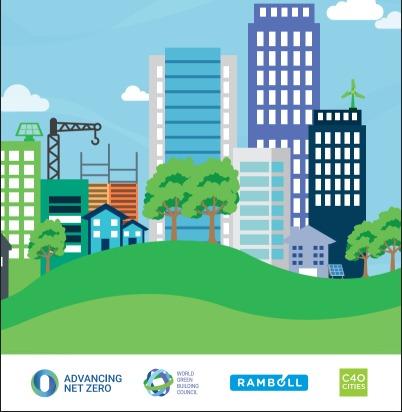With the support of more than 80 organisations, the World Green Building Council’s new report describes actions to revolutionise the buildings and construction sector towards a net zero future, through elimination of embodied carbon emissions.
As part of the 10th annual World Green Building Week, the World Green Building Council (WorldGBC) has issued a bold new vision for how buildings and infrastructure around the world can reach 40% less embodied carbon emissions by 2030, and achieve 100% net zero emissions buildings by 2050.
Together, building and construction are responsible for 39% of all carbon emissions in the world[1], with operational emissions (from energy used to heat, cool and light buildings) accounting for 28%. The remaining 11% comes from embodied carbon emissions, or ‘upfront’ carbon that is associated with materials and construction processes throughout the whole building lifecycle. WorldGBC’s vision to fully decarbonise the sector requires eliminating both operational and embodied carbon emissions.
The ‘Bringing embodied carbon upfront’ report proposes this ambitious goal alongside solutions to accelerate immediate action by the entire building and construction value chain. The vision is endorsed by representatives from developers and construction companies, financial institutions, city networks and government, as well as industry representatives from concrete, steel and timber and many more including: HeidelbergCement, Skanska, Stora Enso, Google and the Finnish Government.
The report sets out to demystify the challenge of addressing embodied carbon emissions, through breaking down complex terminology and creating a common language to set a consensus-built definition for net zero embodied carbon.
Embodied carbon emissions have been overlooked in the past but as shown by milestone research from the Intergovernmental Panel on Climate Change (IPCC), achieving drastic cuts in all carbon emissions over the next decade is critical to keeping global temperature rise to 1.5oC. Addressing upfront carbon is therefore crucial to fighting the climate crisis, as new construction is expected to double the worlds building stock by 2060 causing an increase in thecarbon emissions occurring right now. Therefore, the new report is calling for coordinated action from across the sector to dramatically change the way buildings are designed, built, used and deconstructed.
WorldGBC presents a clear pathway of actions that designers, investors, manufacturers, government, NGOs and researchers across the whole value chain can take to accelerate decarbonisation, address current market barriers and,develop low carbon alternative solutions for market. However, the report warns that change will not happen unless there is a radical shift in how industry works together to enable a market transformation.
The transition towards mainstream net zero carbon standards requires immediate action to achieve greater awareness, innovation, improved processes to calculate, track and report embodied carbon, voluntary reduction targets from industry and roll out of new legislation at city, national and regional level. Approaches such as maximising the use of existing assets, promoting renovation instead of demolition and seeking new circular business models that reduce reliance on carbon intensive raw materials are also needed. To kick-start cross-sector collaboration, WorldGBC is calling for new national and sectoral roadmaps to be developed, such as those produced in Finland, Norway and Sweden, with strong support from industry and policymakers.
Demonstrating the feasibility of achieving zero carbon goals, the report is supported by case studies of existing best practice across the whole breadth of the building industry.
Businesses involved in design and delivery have already committed to ambitious individual or national decarbonisation strategies. For example, Skanska, a major development and construction group is making strides in enabling projects to be evaluated for full lifecycle impacts.
Materials suppliers are also taking a leading role. HeidelbergCement has committed to developing carbon neutral products by 2050, and Dalmia Bharat Cement, one of India’s leading cement manufacturers, is committed to becoming a carbon negative group by 2040.
Cities have also been instrumental in pushing for new innovations and approaches. Oslo, Norway, has a commitment to fossil free construction sites. Vancouver, Canada, has mandated that embodied carbon be reduced in new buildings by 40% by 2030, as part of its climate emergency response, demonstrating the type of regulatory frameworks that can drive market change.
The report can be downloaded HERE in advance of its launch as part of World Green Building Week 2019 taking place 23-29 Sept.
London - UK
23/09 - 29/09/2019




